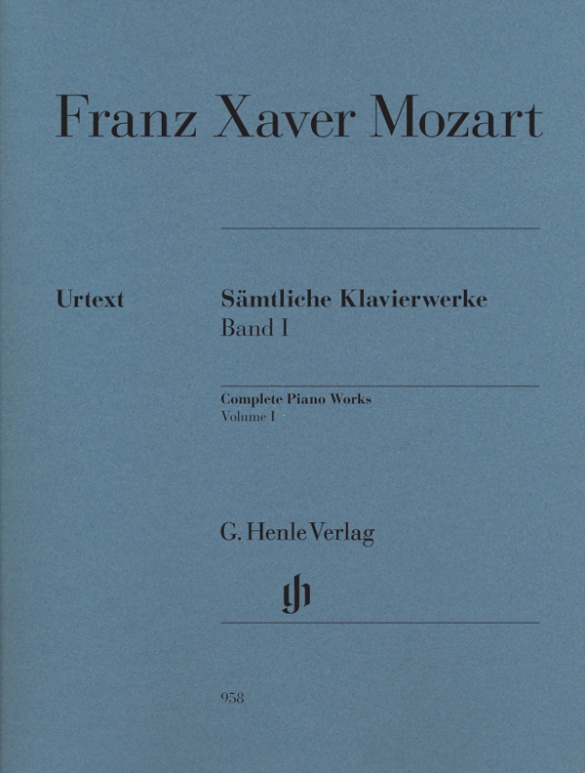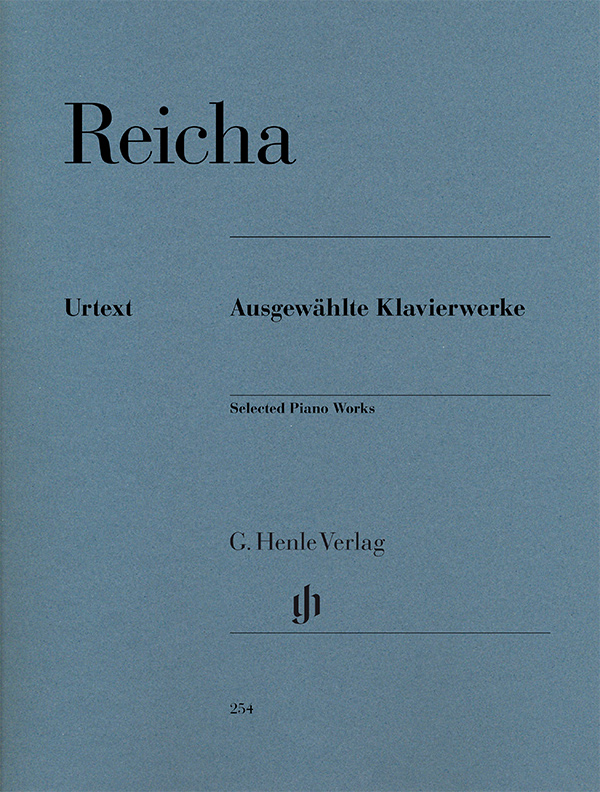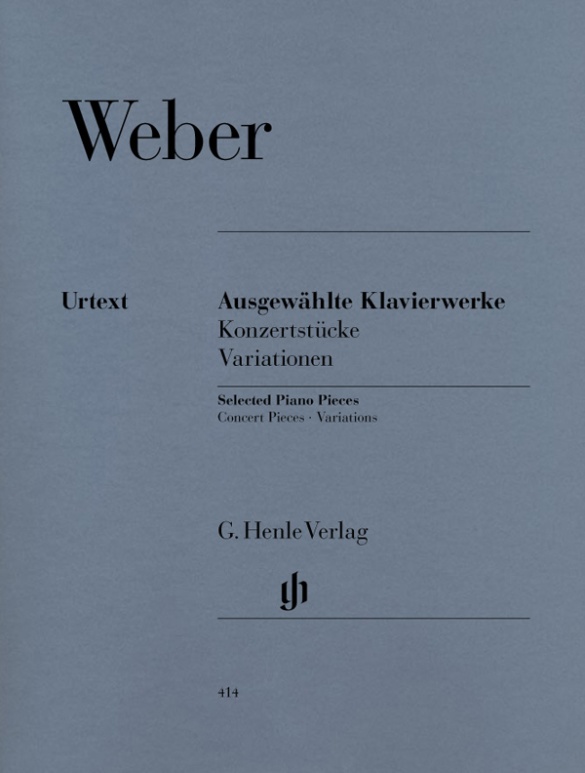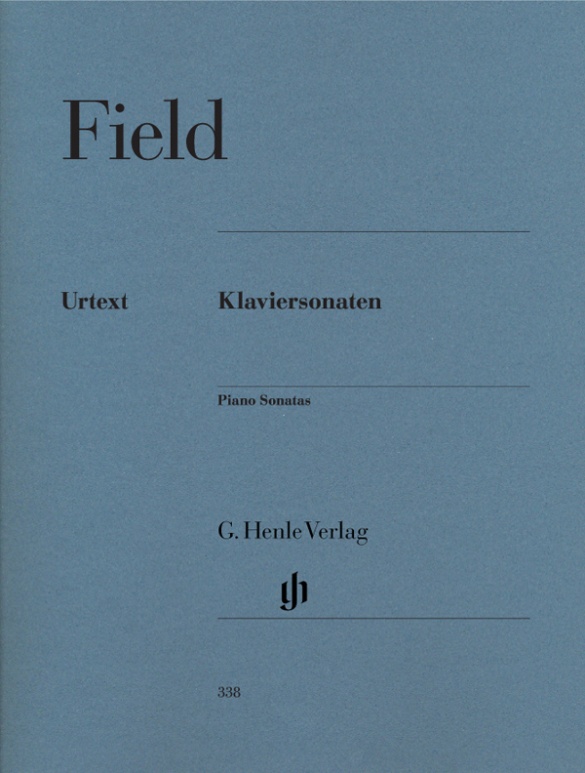

John Field
Piano Sonatas
John Field, a pupil of Muzio Clementi, was in his day a celebrated pianist, credited with almost legendary skill. The Irish piano virtuoso and composer is principally known for his “Nocturnes,” a genre later adopted by Chopin; yet the four piano sonatas in this volume also deserve the highest respect. Since no autographs of them survive, all the important prints issued during Field’s lifetime have been consulted for this Henle Urtext edition. Copies with extensive handwritten annotations by the composer have served as our primary source. Editor Robin Langley’s preface provides information about the sources of the sonatas, answers questions concerning rhythmic execution, and places Field in the historical context of the piano music of his time, making this edition especially valuable.
Content/Details
About the Composer
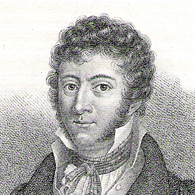
John Field
A composer and pianist from Ireland who enjoyed great international success as a soloist. In Moscow he was co-founder of the Russian School. He primarily composed works for piano, including seven piano concerti, fantasies, rondos, and sonatas, as well as chamber music. Through his eighteen nocturnes he introduced a new genre into Romantic piano literature.
| 1782 | Born in Dublin, probably on July 26. He is taught by his grandfather, an organist. |
| 1792 | By now a pupil of Tommaso Giordani, he makes his debut in Dublin on March 24. |
| 1793 | His family relocates to London, where he is taught by Muzio Clementi and advances to become a popular concert pianist. |
| 1802 | Business trips with Clementi take him to St. Petersburg. He teaches in Narva as Clementi’s assistant. |
| 1804 | Makes his debut with the Philharmonic Society in St. Petersburg in March. |
| 1806 | He makes his debut in Moscow. |
| 1810 | He marries the pianist Adelaide Percheron, with whom he regularly gives concerts. |
| from 1812 | In the primary creative phase of his life, several piano works such as the nocturnes and concerti are written. His compositions spread the world over. |
| 1822 | His Piano Concerto no. 7 and “Fantaisie sur un air favorit” are premiered. |
| 1831 | In London he meets Felix Mendelssohn Bartholdy and Ignaz Moscheles, among others. |
| 1834–35 | After a nine-month stay in hospital in Naples (he suffers from colon cancer) he travels to Vienna, where he gives concerts and meets Carl Czerny. Composes his Nocturne no. 14. |
| 1837 | Dies in Moscow on January 23. |
About the Authors
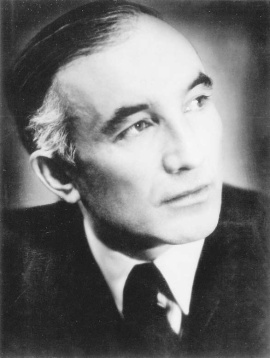
Hans-Martin Theopold (Fingering)
Prof. Hans-Martin Theopold, was born to a pastor’s family in Detmold on 22 April 1904, the youngest of five children. Even as a child he often played the organ in the “Marktkirche” and soon began to take piano lessons with Theodor Vehmeier. At the age of 17 he made his debut at the Landestheater in Detmold with Ludwig van Beethoven’s Piano Concerto in C major under Friedrich Quast (Herford). Following the successful completion of his schooling at the Gymnasium Leopoldinum in Detmold, he went on to study music and piano (main subject): from 1922–23 at the “Württembergische Hochschule für Musik” in Stuttgart (with Max Pauer, 1866–1945) and then from 1923–1928 at the “Staatliche Akademische Hochschule für Musik” in Berlin-Charlottenburg (with Richard Rössler, 1880–1962, and Waldemar Lütschg, 1877–1948). After completing his piano studies (graduating with “very good”) in 1928, he began an active solo career both at home and abroad (USA, Switzerland, Scandinavia, the Baltic states, the Balkans). As a member of the Chamber Music Association of the State Opera in Berlin (from 1933) he also gave countless chamber music concerts, including ones with his violin partner Gustav Havemann (1882–1960).
In the 1930s, audiences and the press alike raved about Theopold’s extraordinary gifts as a pianist: “This young player has it in him to soon become one of the best players in Germany. A superior technique, a wonderful singing piano tone, the strength of a Titan, but not at all hard due to the incomparably gentle elasticity of his touch” [Münchener Zeitung, 21 November 1933]. – “H.M. Theopold gave convincing proof of his splendid pianistic ability in an extremely gripping sonata with a modern idiom by Alban Berg, but predominantly in Schubert’s […] Wanderer Fantasy, which he played with a polished technique and creative power” [Weser-Zeitung, 21 December 1932]. Theopold was awarded several prizes, including the “Grotrian-Steinweg-Preis” in 1928.
In 1937 Theopold became a teacher for the piano (main subject) at the “Bayerisches Staatskonservatorium der Musik” in Würzburg. In 1939 he married Irene Tatjana Wülfing, who was from Moscow. From 1943 he became head of the piano master-class at the “Nordische Musikschule” in Bremen, although this was interrupted by the events of the war. Following his return from a prisoner of war camp, Theopold gave concerts and taught although he did not hold a permanent position. From 1955–1956 he was acting head of the piano master-class at the “Bergisches Landeskonservatorium” in Wuppertal, finally being appointed Professor for Piano on 1 April 1956 at the “Staatliches Institut für Schul- und Volksmusik” in Detmold, later at the “Nordwestdeutsche Musikakademie Detmold” (today “Hochschule für Musik Detmold”), where he taught for decades. On 30 September 1969 he retired. “His students extol his pedagogical gifts. […] Humour, charm, helpfulness and kind-heartedness moderate the strictness of his professional ethos as a musician and teacher” (Lippische Rundschau, 23 April 1969; see also: Lippische Landeszeitung 22 April 1969 on the occasion of Theopold’s 65. birthday: “Prof. Theopold, a modest but at the same time energetic man, is an enthusiastic teacher”). Theopold died in Detmold in 2000.
Contact with Günter Henle was established directly after the publishing house was founded, when Theopold thanked the publishers with great enthusiasm for its first Urtext editions. His extensive correspondence with the publishing house was bequeathed to the Lippische Landesbibliothek in 2014 to ensure its long-term accessibility to the public. The letters testify not only to Theopold’s great interest in musical sources and text questions but also to his initial strict refusal (!) of fingerings in text-critical editions such as these: “For fingerings are and remain something individual no matter what their quality” (letter to Günter Henle from 26 May 1949 {publishing house archives}). Günter Henle was not, however, to be swayed and stressed the necessity of fingerings in his Urtext editions: “It is better to publish the Urtext […] with fingerings that are not necessary for a few individuals, or that might even, I admit, be considered irritating here and there” (letter to Hans-Martin Theopold of 17 September 1953).
It was only in 1955 that Theopold accepted Günter Henle’s offer of contributing fingerings for an Urtext edition that was in the process of being prepared by way of trial. (HN 74, Schubert, Complete Dances for Piano, Volume 1). Following this, Theopold was commissioned to write the fingerings for nearly all of the publishing house’s new editions in quick succession. Günter Henle, himself a good pianist, greatly valued Theopold’s fingerings, and also the many suggestions regarding the musical text in question. In addition, Theopold was always very reliable, thorough and conscientious – something that is not unimportant with editorial work!
Thus to date Hans-Martin Theopold has provided the fingerings for the greatest number of Henle Urtext editions by far – 226 editions (!) in total.
We would like to thank Mrs Margot Theopold and the Hochschule für Musik in Detmold for their great support in providing biographical material.
G. Henle Verlag
Product Safety Informations (GPSR)

G. Henle Verlag
Here you can find the information about the manufacturer of the product.G. Henle Verlag e.K.
Forstenrieder Allee 122
81476 München
Germany
info@henle.de
www.henle.com
recommendations
autogenerated_cross_selling
Further editions of this title
Further editions of this title


